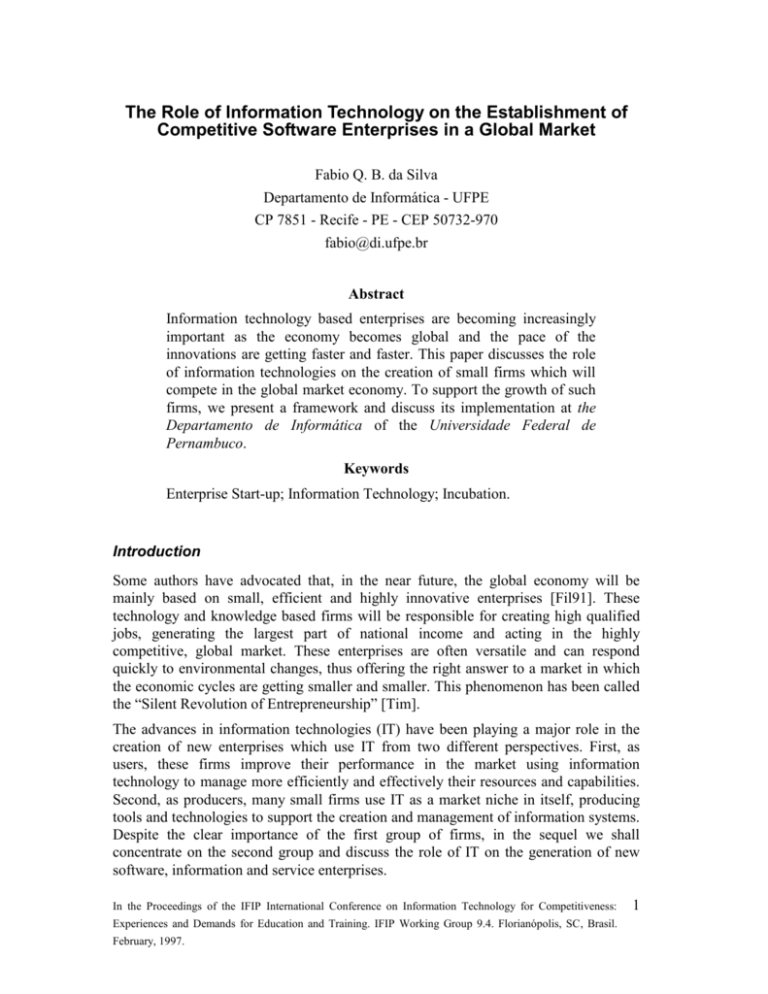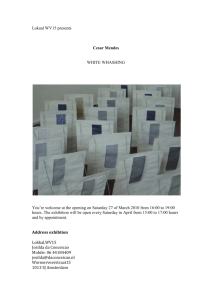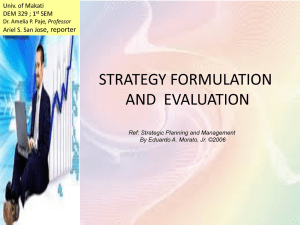The Role of Information Technology on the Establishment of
advertisement

The Role of Information Technology on the Establishment of Competitive Software Enterprises in a Global Market Fabio Q. B. da Silva Departamento de Informática - UFPE CP 7851 - Recife - PE - CEP 50732-970 fabio@di.ufpe.br Abstract Information technology based enterprises are becoming increasingly important as the economy becomes global and the pace of the innovations are getting faster and faster. This paper discusses the role of information technologies on the creation of small firms which will compete in the global market economy. To support the growth of such firms, we present a framework and discuss its implementation at the Departamento de Informática of the Universidade Federal de Pernambuco. Keywords Enterprise Start-up; Information Technology; Incubation. Introduction Some authors have advocated that, in the near future, the global economy will be mainly based on small, efficient and highly innovative enterprises [Fil91]. These technology and knowledge based firms will be responsible for creating high qualified jobs, generating the largest part of national income and acting in the highly competitive, global market. These enterprises are often versatile and can respond quickly to environmental changes, thus offering the right answer to a market in which the economic cycles are getting smaller and smaller. This phenomenon has been called the “Silent Revolution of Entrepreneurship” [Tim]. The advances in information technologies (IT) have been playing a major role in the creation of new enterprises which use IT from two different perspectives. First, as users, these firms improve their performance in the market using information technology to manage more efficiently and effectively their resources and capabilities. Second, as producers, many small firms use IT as a market niche in itself, producing tools and technologies to support the creation and management of information systems. Despite the clear importance of the first group of firms, in the sequel we shall concentrate on the second group and discuss the role of IT on the generation of new software, information and service enterprises. In the Proceedings of the IFIP International Conference on Information Technology for Competitiveness: Experiences and Demands for Education and Training. IFIP Working Group 9.4. Florianópolis, SC, Brasil. February, 1997. 1 After a long period of economic instability, Brazil is facing the perspective of long term monetary stability and industrial growth. The money invested in the financial market during the period of high inflation rates now seeks investment opportunities in the productive sector. In this context, the IT industry appears as an important alternative for investment for a number of reasons. On the one hand, the country has several universities and research centres which have been producing high quality research and human resources on IT and related areas. On the other hand, because the IT industry does not demand large capital investments, it is one of the few alternatives for sustained growth in regions in which manufacturing industry is in decline or does not even exist. This is the case of the north-east region of Brazil, where the IT industry is a less expensive and more ecological complement to manufacturing industry and agriculture. The Department of Informatics of the Federal University of Pernambuco (DI-UFPE) has been aware of this potential and has invested for two decades on human resources qualification at graduate and postgraduate levels, being one of the largest academic departments in IT of Brazil. At DI-UFPE, there are currently over 45 staff with doctoral degree undertaking state-of-the-art research in IT and related areas, and 150 master thesis have been developed in the past 20 years. To realise the business potential of both human resources and a large research basis, DI-UFPE launched, in 1993, the Recife Centre for Advanced Studies and Systems (CESAR™) [Ces96]. The Centre is a technology transfer and business innovation enterprise that sets up, manages and executes collaborative projects between industry and university, supports the start up of new software enterprises from graduates and academics, and manages a science park and incubator unit that hosts innovative software, information and services firms. CESAR believes that, to be competitive in the global market, these firms must produce global quality software and services and this requires a strong research basis on IT. On the other hand, these firms seldom can grow and become successful in a hostile environment without help from supporting organisations like incubators, innovation centres and science parks. The combination of research and business support found at CESAR has helped various start up enterprises to enter the competitive global IT market. In this paper, we shall discuss the role of IT in the development of start up software firms and how CESAR has played a crucial role in this development by building a bridge between the academic IT knowledge and the needs of the small enterprises. We shall also emphasise that the use of the Internet by the enterprises created and hosted at CESAR has played a diversified and central role on their success in the internal and external market. We follow by analysing a case study of an IT firm hosted at CESAR, which is commercialising its research originated product in the foreign market. We then finish showing the links between CESAR and the Brazilian Programme for Excellence in Software (SoftEx-2000/CNPq/MCT) . CESAR at a Glance In the Proceedings of the IFIP International Conference on Information Technology for Competitiveness: Experiences and Demands for Education and Training. IFIP Working Group 9.4. Florianópolis, SC, Brasil. February, 1997. 2 The Recife Centre for Advanced Studies and Systems (CESAR) is a not-for-profit and non-government organisation committed to research, training and consulting on IT for the development and innovation of the society and the industrial and academic sectors. The Centre assists academics and young entrepreneurs to turn the product of their research on IT into marketable products and services. The CESAR’s project development and new enterprises units are located at the Department of Informatics of UFPE. The stimulating and dynamic IT research and development environment of the Department makes this location ideal for new enterprises to be created and grow: there is a large and consolidated academic basis, which is carrying out research and development on the state-of-the-art and state-of-the-practice in IT; CESAR manages collaborative projects with industry, bringing market demands to the University and transferring knowledge and technology to Industry; undergraduate and postgraduate students are educated in entrepreneurship and stimulated to start up their own firms after finishing their studies. CESAR acts in three complimentary ways to promote Industry and University interaction and foster the creation of new IT firms, which are depicted in the following picture: Collaborative Projects New Enterprises Science Park Direct demands by Industry are treated at CESAR by the Collaborative Projects Unit, which manages all phases of the collaboration: initial contact, research and development contracts, project team composition, project management and commercialisation of results (if it is the case). Development teams often spin off from CESAR to start up a new enterprise with the collaborating firm as their first client. For instance, CESAR has done contract research and development for the largest supermarket chain of the north-east region, called Grupo Bom Preço. In this collaboration, a development team designed and implemented the Internet site of the Grupo Bom Preço. Enterprise start up and the early incubation stages of enterprise development are carried out by the New Enterprises Unit. CESAR employs a two stage operational model In the Proceedings of the IFIP International Conference on Information Technology for Competitiveness: Experiences and Demands for Education and Training. IFIP Working Group 9.4. Florianópolis, SC, Brasil. February, 1997. 3 which caters for different levels of enterprise maturity. This model is explained in detail in the next section. Most enterprises originated at CESAR have a strong demand on new developments and research results in IT. Therefore, it is vital for their continued development to stay in close contact with the academic environment where these research and development are being carried out. The Science Park Unit hosts such enterprises providing high quality installations at a foot step from the Department of Informatics. It also promotes IT seminars and colloquia in which enterprises and academics meet together to exchange information and discuss strategic uses of IT for business. The organisational structure of CESAR comprises a board of 3 directors, the executive secretary of the Directorate, 1 manager for each of the 3 units described above, 1 visual designer, and 2 secretaries. CESAR has no permanent technical staff. The technical teams are assembled for a specific project and dismounted when the project finishes. This task oriented administration has proved to be very efficient for the kind of activity carried out at CESAR. Enterprise Generation and Support at CESAR The New Enterprise Unit is committed to foster the start up of IT based firms and support the development of competitive products and services for the global market. To achieve this goal, a blend of a strong research and development basis on IT with training in entrepreneurial skills, such as marketing, management and quality control, are necessary. Furthermore, young entrepreneurs must be in close contact with market demands to be able to anticipate new business opportunities. This is exactly the environment found at CESAR, which has spun off a number of new enterprises that are already selling in the foreign market. The New Enterprise Unit follows a four layer model in the process of enterprise generation and support. This process is a blend of financial and infrastructure support with training in management and entrepreneurship. The model serves as a guideline for the classification of the maturity level of an enterprise or entrepreneur and then to deliver the most appropriated support and training. Due to the dynamic nature of small enterprises, it is occasionally necessary to adapt the model to the firms reality, and the model has proved to be flexible enough for that. In the Proceedings of the IFIP International Conference on Information Technology for Competitiveness: Experiences and Demands for Education and Training. IFIP Working Group 9.4. Florianópolis, SC, Brasil. February, 1997. 4 Phases Collaborative Projects Graduated Students Students ( 2 Initial Stage) Advanced Stage ( 3 ) Project Team Composition ( 2 ) Enterprise Start up Analysis and Enrichment Enterprise Consolidation Incubation Post-incubation Science Park A new enterprise may be created either spontaneously by a (group of) young entrepreneurs which identifies a market opportunity, or by a direct market demand. In the latter case, a project team leaves a collaborative project to either finish and commercialise a product originated from the project or to provide services to (some of ) the project’s partners. For instance, NetFlow™ is a small firm that develops Internet and Intranet solutions, which span off from the collaborative project carried out for Grupo Bom Preço, explained above. In either case, students and graduates are the main human resources of the process. New enterprises enter a two stage pre-incubation process (described in greater detail in [dSA96]), in which they receive support, training and, depending on their market potentials, finance. This phase usually takes from 12 to 18 months. Successful firms leave this phase to go to the Incubator or directly to the Science Park. The Analysis and Enrichment phase of the model is carried out by venture capital firms, which analyse the new enterprises potentials for receiving venture capital. In the past six months, the New Enterprises Unit has fostered the creation of various new firms, of which 2 are already selling in the foreign market, 2 have left CESAR and are established outside, and 2 have left the Enterprise Start up phase directly to the In the Proceedings of the IFIP International Conference on Information Technology for Competitiveness: Experiences and Demands for Education and Training. IFIP Working Group 9.4. Florianópolis, SC, Brasil. February, 1997. 5 Science Park. Some of these cases are discussed in the next section. On average, CESAR is equipped to host the generation of 5 new enterprises every year. Cases of Success Several IT firms, created at CESAR, will be briefly analysed in this section according to two dimensions of the impact of IT research and development in their businesses: patterns of innovation and patterns of Internet use. Patterns of innovation: the first dimension defines the path from research in IT to a marketable software product or technology: Research originated products: in this category, results from postgraduate research were further developed in the Incubator Unit until a finished product was achieved. Meanwhile, the entrepreneurs received training on the managerial aspects of running their businesses. Visual Instances™ from D.O.I.T.™ Ltd. and EquipMaint™ from In Forma Software™ Ltd. are software products originated through this path which have already reached the foreign market. Research enabled technologies: the research in WWW and data base integration gave raise to WISE™ (Web-based Information Systems Engineering), a marketable technology in the area of information systems and Intranet. This technology derived from a project that developed the Brazilian software catalogue [Cat96]. The original technology was further developed by a research team that spun off the project, and is being commercially exploited by CESAR and a start up firm. Demand driven technologies: some of CESAR’s clients are Government institutions which place a heavy demand on advanced information technologies. This demand has given raise to marketable products and technologies which are commercialised by small start up enterprises. One example of this kind of demand driven product is the software Tramita™, developed and commercialised by Software & Soluções™, a firm incubated at CESAR, which is specialised in developing information systems for document processing in large organisations. Patterns of Internet use: as an information system and a vast source of knowledge on information technologies, the Internet is becoming increasingly important as a support tool for enterprise generation. In particular, the Internet is fundamental to allow small enterprise to reach the foreign market more easily. The Internet is used by the firms hosted at CESAR in a number of ways: Information retrieval: most of the firms use the Internet as a (non expensive) source of information to their business plans. This allows the firms to collect market information in the foreign market without incurring on the very expensive costs of contracting professional assistance abroad. In Forma Software is a typical example of such firm which uses the Internet to learn In the Proceedings of the IFIP International Conference on Information Technology for Competitiveness: Experiences and Demands for Education and Training. IFIP Working Group 9.4. Florianópolis, SC, Brasil. February, 1997. 6 about new competitors or possible partners. In particular, they make extensive use of this source of information to export products to Europe. Electronic commerce: Some of the enterprises at CESAR use the Internet as a sales channel. It is the case of D.O.I.T., which sells its products via the World Wide Web, reducing enormously the costs with packaging and distribution, and reaching over 20 countries without the need of an office in each one of them. The technology necessary for this commerce was also developed at CESAR, by D.O.I.T. itself, and shows another facet of the importance of IT in the small firms marketing strategies. Business enabling technology: the Internet and associated technologies are making possible the start up of new business that, much more easily, can reach the foreign market. The commercial exploitation of the technological potential of the Internet is being realised by several firms at CESAR, including WISER™, which is an information provider and also develops technologies and products to other information providers. In the following section, the importance of IT for the creation and support of small software enterprises is discussed in detail using a case study of a firm incubated at CESAR. Object Oriented Technologies: the D.O.I.T. experience D.O.I.T.’s mission is to develop high quality tools, software components and services for object oriented development environments. The firm’s first product, Visual Instances for Smalltalk, was developed from the technological results of its president’s master theses and is available on the Internet since July 1996. Since its creation, D.O.I.T. has made extensive use of state of the art information and software technologies which are available at the Department of Informatics of UFPE. This has been found to be a strong market advantage of the firm with respect to its competitors. In particular, the Internet and related technologies have helped every stage of the product’s development: technology research and product design: during this stage, electronic mail and file transfer has enabled up to date access to technical papers that allowed Visual Instance’s technology to be developed and the product design to be carried out to achieve customer satisfaction in the global market; product development: at this stage, the Internet was used by the development team to exchange project information. Meanwhile, the WWW was used to find out information about the foreign market and commercialisation channels abroad; product packing: the review phase, packing and manual translation was carried out in the United States through the Internet, reducing drastically the costs; product commercialisation and maintenance: the software is available in the Internet and maintenance is provided using sophisticated groupware tools, which allow on line information exchange with customers. In the Proceedings of the IFIP International Conference on Information Technology for Competitiveness: Experiences and Demands for Education and Training. IFIP Working Group 9.4. Florianópolis, SC, Brasil. February, 1997. 7 D.O.I.T. considers IT a key element for its competitiveness and market success. CESAR and SoftEx-2000 Since its creation in 1993, CESAR has kept strong links with the Brazilian Programme for Excellence in Software (SoftEx-2000). The Universidade Federal de Pernambuco (UFPE) is one of the partners of the SoftEx-2000 basis in Recife (SoftEx Recife) and CESAR hosts 2 software enterprises that are associated with SoftEx Recife. Furthermore, CESAR is one of the partners of Recife BEAT (Recife Basis for High Technology Enterprises), which is the enterprise generation laboratory of the SoftEx2000 GENESIS Project in Recife. The GENESIS Project is described in detail in [dSA96]. Concluding Remarks In this paper we analysed the importance of IT in the creation of new software, information and services firms. It is clear that the global economy is rapidly changing and demand enterprises that can rapidly respond to environmental changes with quality and cost effective products. In this context, IT enables traditional business to improve their performance in their markets and also opens various business opportunities to IT based firms. We also discussed various patterns of innovation by which research on IT is transformed into marketable products. The role of the Internet on IT based firms was discussed in some detail. We finished by briefly describing an example of an IT enterprise which demands heavily from the academic research results and uses the Internet to acquire the extra competitive edge. This article showed a support framework for the creation of IT based firms and some of the results obtained by operating such a framework inside an academic department for over three years. The CESAR experience has proved to be successful and can be replicated in other institutions inside and outside Brazil. CESAR has a qualified team that may help institutions to start up a similar enterprise. In the Proceedings of the IFIP International Conference on Information Technology for Competitiveness: Experiences and Demands for Education and Training. IFIP Working Group 9.4. Florianópolis, SC, Brasil. February, 1997. 8 Acknowledgements The author would like to thank Flávio Pimentel and D.O.I.T.’s president, Paulo Lisboa, for the material that inspired some of the sections of the paper. Prof. Fernando Dolabela provided invaluable information on entrepreneurship. Thanks also to Prof. Silvio Meira, Carlos Cordeiro, Ismar Kaufman, and Luis Wolmer for important comments on a first draft of this paper. The author is sponsored by the Brazilian Government Agency CNPq and by the Brazilian Programme for Excellence in Software (SoftEx-2000). Bibliography [Cat96] The Brazilian Software Catalog. http://www.cesar.org.br/software. [Ces96] Centro de Estudos e Sistemas Avançados do Recife (CESAR). http://www.cesar.org.br. [dSA96] Fabio Q. B. da Silva and Eratóstenes E. R. Araújo. Enterprise Start-ups in Academic Environments: The Genesis Project. In Proceedings of the V World Conference on Science Parks. Rio de Janeiro, Brazil, [Fil91] L. J. Filion, Vision et Relations: Clefs du succès de l'entrepreneur . Les Éditions de l'Entrepreneur, Montreal, Canada, 1991. [Tim] J.A. Timmons. New Venture Creation, Homewood IL:IRWIN. Biography Fabio Queda Bueno da Silva is a PhD in Computer Science, Laboratory for Foundations of Computer Science, University of Edinburgh,1992. Dr. Silva has joined the Departamento de Informática, Universidade Federal de Pernambuco, in 1993. Currently, he is an associate professor at UFPE, the finance director of CESAR and the national coordinator of the GENESIS Project. In the Proceedings of the IFIP International Conference on Information Technology for Competitiveness: Experiences and Demands for Education and Training. IFIP Working Group 9.4. Florianópolis, SC, Brasil. February, 1997. 9








